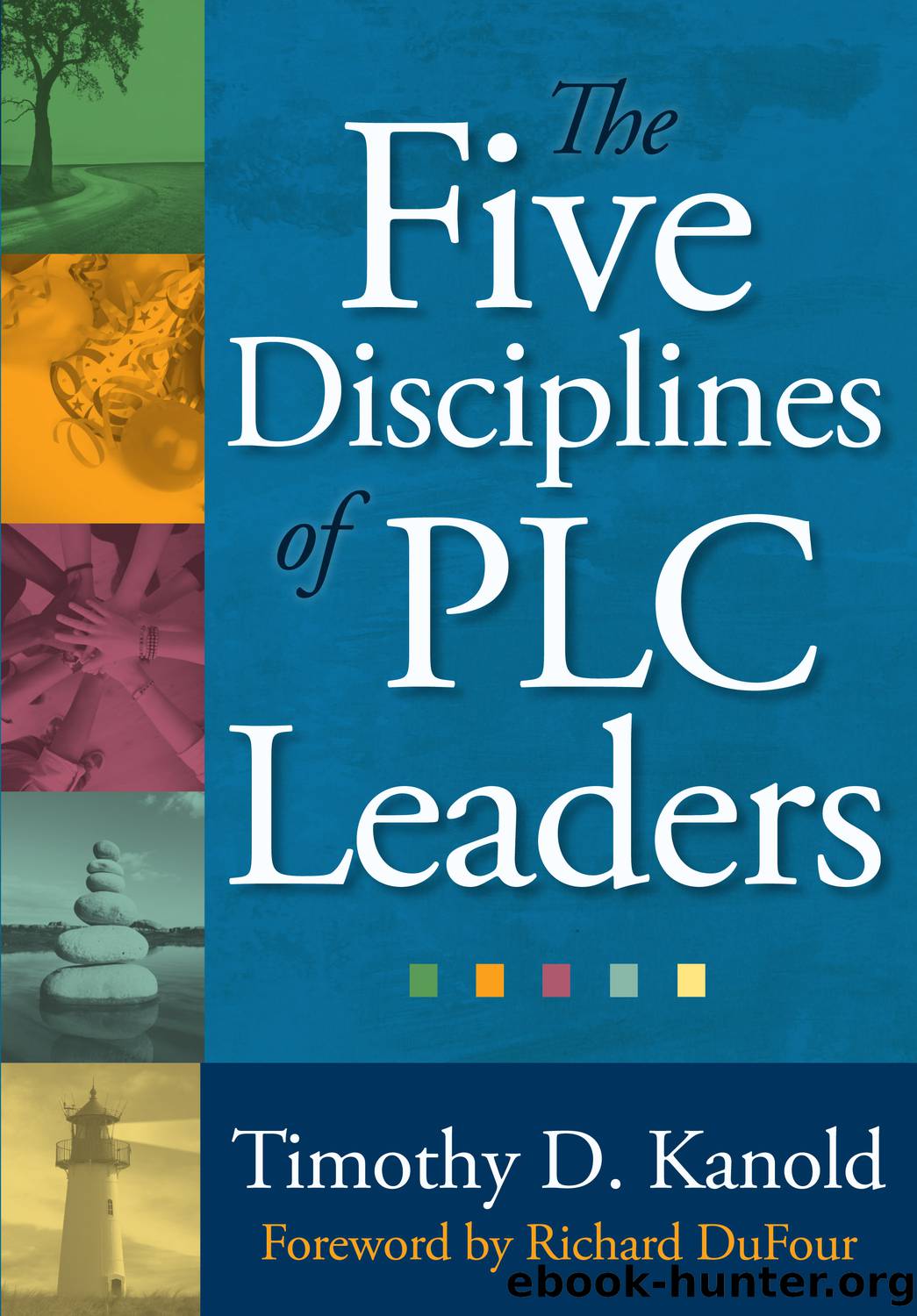The Five Disciplines of PLC Leaders by Kanold Timothy D.;

Author:Kanold, Timothy D.;
Language: eng
Format: epub
Publisher: Solution Tree
Published: 2011-08-15T00:00:00+00:00
Use Good Judgment Criteria
In 1987, my second year as a school leader, I decided that the faculty in my leadership area (math and science) were not sufficiently sharing the workload. I made the judgment call that all teachers should move from two preparations (or courses to teach) to three preparations for the following year. This judgment was based on my previous personal experience; before I became a school leader, I had always taught at least three different types of courses. It was also based on my thoughts about some teachers needing to move out of their comfort zone and into new areas of the curriculum. For three weeks, I worked on a master schedule, which I released to the faculty two days before the end of the year.
The response of the faculty to my leadership judgment call is not printable. I created a firestorm of criticism and angstâa firestorm that I could have avoided. To say the least, in making this call, I had not acted responsibly toward those to whom I was accountable.
What went wrong, other than I had violated every principle of exercising good judgment? I had made some fatal mistakes:
⢠I failed to tie the action to results. What student achievement results were to improve as a result of this leadership action?
⢠I failed to empathize with others and anticipate their responses to the additional burden I was creating.
⢠I failed to listen. Actually, I failed to ask anyone in my N-S-E-W sphere if they thought this was a good judgment.
⢠I failed to understand that leadership is a team sport, and good judgment must be exercised by and involve everyone, especially the leader.
⢠I failed to gather local knowledge about why the current two-preparation system made sense to our faculty, even though it made no sense to me at the time.
⢠I had failed to identify any research that would support my decision.
In this instance, my âintuitionâ failed because I failed, as a leader, to blend deliberate and thoughtful analysis into my judgment, and I failed to take into account the thoughts and feelings of others.
Within a few weeks, I created a new master schedule and began discussions with key departmental leaders about how to best begin expanding the facultyâs curricular awareness without causing shock waves to ripple though the school. I also personally apologized to my entire staff at an end-of-the-year meeting. This was a hard-won lesson about the importance of input from those who will be affected by leadership decisions. I could have avoided the problems I created by following some important criteria for making good judgment calls. To reiterate, the criteria are:
1. Tie any decision-making action to results. What student achievement results do you expect to improve because of this leadership action?
2. Empathize with others. What will be the expected reality placed on others? Anticipate their responses to the additional expectations from their perspective.
3. Take time to listen. Field-test and ask those in your N-S-E-W sphere if they think the decision-making action will result in good judgment.
Download
This site does not store any files on its server. We only index and link to content provided by other sites. Please contact the content providers to delete copyright contents if any and email us, we'll remove relevant links or contents immediately.
Macmillan Primary Grammar 2 Pupil's Book by Unknown(444)
Figuring Out Fluency in Mathematics Teaching and Learning, Grades K-8 by Jennifer M. Bay-Williams & John J. SanGiovanni(398)
The Principal's Guide to Curriculum Leadership by Sorenson Richard D.;Goldsmith Lloyd M.;Mendez Zulma Y.;Maxwell Karen T.;(310)
Learning from Accidents 3rd ed by Trevor Kletz (2001)(288)
Harnessing Technology for Deeper Learning by Scott McLeod(269)
English Grammar Practice--The Noun by Roxana Nastase(269)
Text-Dependent Questions, Grades K-5 by Douglas Fisher & Nancy Frey & Heather Anderson & Marisol Thayre(254)
A Guide to Curriculum Mapping by Hale Janet A.;(241)
How to Do Everything with Google Tools by Unknown(241)
English Language Program Administration by Unknown(237)
The Grammar Teacher's Activity-a-Day by Jack Umstatter(224)
Deep Change Leadership by Reeves Douglas;(219)
The Power of SMART Goals by Conzemius Anne;O'Neill Jan; & Anne Conzemius(208)
Using Data to Close the Achievement Gap by Johnson Ruth S.;(195)
Functional Neuroradiology: Principles and Clinical Applications by Scott H. Faro (editor) Feroze B. Mohamed (editor)(192)
Aligning and Balancing the Standards-Based Curriculum by Squires David A.;(187)
Beyond the RTI Pyramid by Bender William N.;(187)
Using Equity Audits to Create Equitable and Excellent Schools by Skrla Linda E.;McKenzie Kathryn B.;Scheurich James Joseph;(185)
Skill Building for ESL and Special Education : Student Textbook by Kristine Setting Clark(185)
